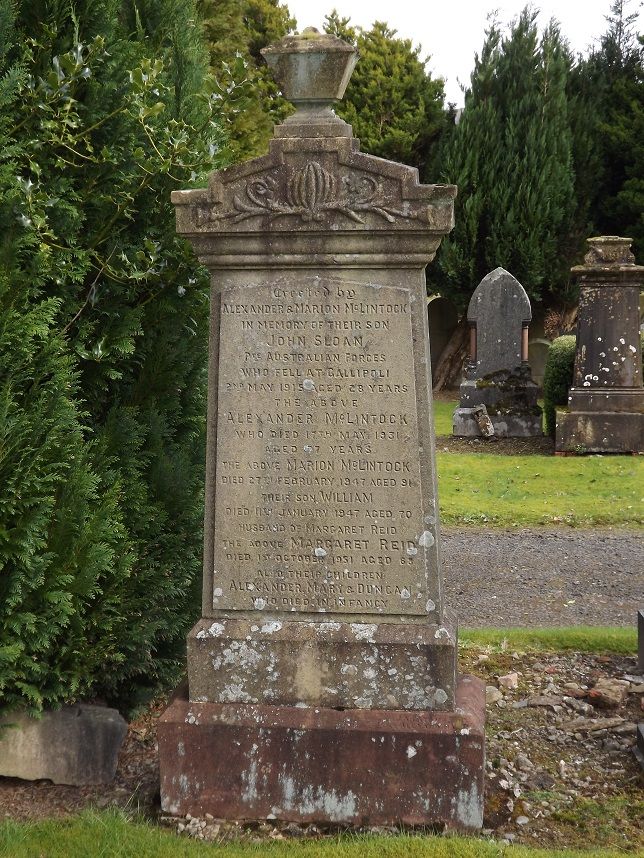Alexander "Sandy" or "Alex" McLintock

Alexander "Sandy" McLintock was born in 1853 and probably in Dunbartonshire in Bonhill, although other sources have him Paisley-born. He was the son of a Colour-mixer, but he did not follow his father into the print-fields, instead he became a tinsmith, a plumber, and later a gasfitter. Moreover, his was a life, for all but a brief period in Burnley in England, spent almost entirely in Bonhill and across the River Leven in Alexandria. He married there. His children were born there. He died there and, as well as in Scotland's, most of what was an illustrious footballing career was spent in the colours of his local, major club, Vale of Leven.
At fifteen Sandy McLintock seems to have lost his mother, Agnes, whose birth appears to have been in Lochalsh in Ross-shire so a Highlander, yet the following year his father remarried, to Margaret McAllister. However, the family remained tight, that is until in 1876 Sandy himself married Marion Sloan. They were to have six children, four first two girls, incidentally named Margaret and Agnes, presumably after his step-mother and mother respectively, and four boys. And in the meantime football had arrived in the Vale of Leven, with every likelihood that nineteen year old Alex was at Park Neuk that very day in 1872. Certainly from 1874, a year after it foundation, he became part of the Vale of Leven team that in December 1876 was the first Scottish one to defeat Queen's Park and also of the one that from 1877 would take three, consecutive Scottish Cups. In that period at half-back and described as "as hard as nails" he formed a formidable partnership with Andy McIntyre. Both would go on to to win Scottish caps, McLintock on three occasions between 1875 and 1880, a draw and then two wins, the last dropping to full-back.

Sandy would continue to play for Vale of Leven until 1884. He was, aged thirty and now in goal, in the losing Vale team in the Scottish Cup Final of 1883. And he would probably have been in the Final team again in 1884, had The Vale due of sickness, he included, not allowed Queen's Park a walk-over, at which point he moved south, turning professional with Burnley. There he played for two more seasons, whilst also running a pub, before retiring through a leg injury and taking up refereeing. However, that was to be not without controversy and in 1888 he returned to Scotland to Alexandria, to his trade as a tinsmith and also, it seems, to train Rangers for a while.

And McLintock would remain living in Alexandria for the rest of his life. Off the field he would dabble briefly, working as Cloth Dyer so locally but he would return to his first trade and pipework, employed still into his late sixties then by the Denny & Bros. Shipyard in Dumbarton, presumably commuting. This was whilst from touch he would watch as one of his sons, James, would himself play for Vale of Leven but without the same success.
Sandy would pass away in 1931 at his home in Alexandria at the age of seventy-seven to be buried in the town's Vale of Leven Cemetery. Marion, his wife, would outlive him by sixteen years, dying in 1947 in Dumbarton.
Birth Locator:
1853 - Paisley, Renfrewshire or Bonhill, Dunbartonshire
Residence Locations:
1861 - Smith's Land, Braehead, Bonhill, Dunbartonshire
1871 - Turnbulls, Alexander St., Alexandria, Dunbartonshire
1881 - 1, North St., (Off Main St.) Bonhill, Dunbartonshire
1891 - 13, North St., Bonhill, Dunbartonshire
1901 - 60, Susannah St., Alexandria, Dunbartonshire
1911 - 51, Susannah St., Alexandria, Dunbartonshire
1921 - 50, Wilson St., Alexandria, Dunbartonshire
Death Locator:
1931 - 40, Wilson St., Alexandria, Dunbartonshire
Burial Locator:
Vale of Leven Cemetery, Alexandria
Back to Alexandria and Bonhill,
or the SFHG Home page